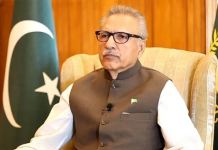
متعلقہ مضامین
-
Omair Rana advises PEMRA to do what’s right, not popular
-
Masood pays rich tribute to late Peer Jhagvi
-
US special envoy holds talks with Afghan leaders on peace process
-
Sri Lanka’s plan to bury Muslim Covid-19 victims on islet sparks outcry
-
National Covid death toll crosses 13,000 mark
-
Court stops govt from acquiring land for Ravi urban project
-
IHC orders removal of ex-ISI chief Asad Durrani’s name from ECL
-
Bilawal hints at bringing no-trust motion against PTI in Punjab first
-
Roadside bombing kills 5 Pakistani workers, wounds 2 troops
-
Tourism Expo and Family Festival, PM’s vision to promote tourism sector for creating jobs: Shibli
-
Opposition’s demand of mid-term elections unconstitutional: Governor
-
One dead, 30 injured as train derails near Rohri












